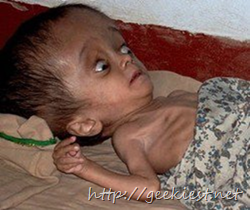
The Ban on endosulfan, the desion will be made on the evening session of United Nations Environment Programme.
The ban of Endosulfan, the most hazardous chemicals produced, has been supported by most of the nations,including the European Union, African nations and many more. However, India, Japan, South Korea, Bolivia, Oman and China are against the ban of Endosulfan. Approximately, 125 countries supported the global ban on the Endosulfan.
update: India is the only country who is opposing Endosulfan Ban now, as China supported conditional Ban of Endosulfan.
I have heard and read many articles and photos of the victims of this chemical at Kasargod District in Kerala, where Women aborting just because of they are afraid to give birth to handicaped or mentaly retarded babies. The amount of Endosulfan in their milk is 500% more than the allowed rate. The picture above is one of the victim. And it is a shame on the Manmohan Sigh ministry and Congress leaders from Kerala not to raise their Voice against Endosulfan and “India is against the Ban of Endosulfan”
From Facebook Read this too
Endosulfan is a broad-spectrum organochloride insecticide, which is very toxic to organisms and the environment. Studies in India and abroad had detected its residues in nearly 5,000 most widely consumed foods, including fruits, vegetables, fish and meat. High levels of residues were detected in all samples of cauliflower and brinjal taken in Ranchi (Jharkhand) in 2005. It has been found in grapes, guava, rice and mangoes in India
While acute toxicity from the chemical can cause death and several other problems, chronic exposure of smaller quantities of pesticide over a long period hits the immune, endocrine, reproductive and nervous systems, causing a wide range of problems. The health survey showed that 526 victims of Endosulfan in Kasaragod district were bedridden.
A survey done by the Health Department (at Kasargod, Kerala) has identified nearly 4,000 victims after screening 16,000. The household survey and the screening done in 11 affected panchayats during December and January identified 3,937 victims, besides 336 in nearby panchayats. The numbers are likely to go up at least by 500 as the Health Department continues to receive complaints about non-inclusion on the list. The survey and accompanying studies officially confirmed the extent of damage done by the pesticide, which the Centre denies.
Story of Kasargod, Kerala:
From the mid 1970s, the pesticide endosulfan has been aerially sprayed on a cashew nut plantation covering several villages in Kasargod District, Kerala State, India. People residing in the villages within the plantation have been afflicted with different kinds of illnesses which, according to the villagers, were not present before the cashew nut plantation started their operations.
People also noticed the death of fishes, honeybees, frogs, birds, chicken and even cows. In 1979, a farmer began to suspect that the pesticides being aerially sprayed in the plantation might have caused the deformities and stunted growth, which, he observed in 3 of his calves. A journalist reported the story warning that endosulfan, the pesticide used in the aerial spraying, might have been the cause. The story raised awareness among the people who started voicing out their complaints about health problems and environmental damage.
BAN ENDOSULFAN,BREAK THE SILENCE.
I WISH the decision to BAN ENDOSULFAN will come today.
BAN ENDOSULFAN AND SAVE THE WORLD